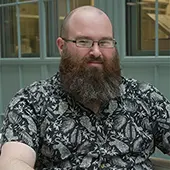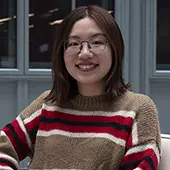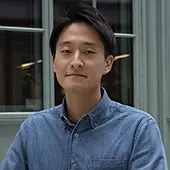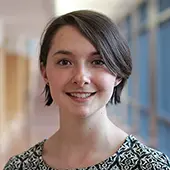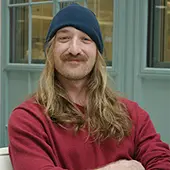2019-2020 Cluster Fellows
Nathan Bradshaw
Department/Program: Materials Science and Engineering
Faculty Advisors: Mark Hersam, Walter P. Murphy Professor of Materials Science and Engineering, Professor of Materials Science and Engineering and (by courtesy) Electrical and Computer Engineering, Director of Materials Research Science and Engineering (MRSEC)
Status of Studies: Fifth Year
What is your area of focus at Northwestern?
I develop scalable methods of processing two dimensional materials like covalent organic frameworks and hexagonal boron nitride.
Why were/are you interested in a fellowship?
I am interested in how scientists share their findings with non-scientists. I like to explore how narratives can be used to help people learn more about being environmentally conscious and more informed about the science behind new and greener methods of producing energy.
What are your plans/hopes for the future?
In the future, I hope to teach others science and explore methods of increasing participation in science fields by traditionally underrepresented groups.
What is most exciting about your life as a student and fellow?
I am constantly encouraged by the drive from other graduate students to contribute to the communities they live in and care about. This can range from participating in the sunrise movement, teaching senior citizens about cutting-edge science, or researching how to make more efficient batteries.
Yijing Chen
Department/Program: Chemistry
Faculty Advisor: Omar Farha, Charles E. and Emma H. Morrison Professor in Chemistry; International Institute for Nanotechnology;
Professor of Chemical and Biological Engineering (Courtesy Appointment); Executive Editor of ACS Applied Materials & Interfaces,
and Joseph T. Hupp, Charles E. and Emma H. Morrison Professor of ChemistryStatus of Studies: Fourth Year
What is your area of focus at Northwestern?
One of the most efficient methods to mitigate atmospheric CO2 is biological carbon fixation. This process is widely observed in nature, with the photosynthetic process being a commonly known example, and these processes usually require the participation of enzymes as catalysts as well as recycling coenzymes. However, the high cost of enzymatic cofactors and the instability of common CO2 fixation enzymes in non-physiological conditions have limited the development of this method. As a solution, my research focuses on designing a class of highly porous materials called metal-organic frameworks to immobilize and stabilize carbon-fixing enzymes while realizing the regeneration of cofactors with a renewable source of energy (e.g. electricity or sunlight).
Why were/are you interested in a fellowship?
Sustainability and climate change have always been intriguing to me and thus it became the focus of my study. The Trienens Institute allows me to learn more about climate change and the possible solutions through taking courses and serving as a TA. The Trienens Institute also provides me with the opportunity to interact with people from diverse academic backgrounds and to work with them to address the world’s energy problem in a more sustainable way.
What are your plans/hopes for your future?
I hope to continue doing research in industry and to develop products that are good for the environment and synthesize them in a more sustainable way.
What is most exciting about your life as a student and fellow?
Learning about climate change and sustainability from a different perspective through Trienens Institute courses is very inspiring and it also brings me ideas of how to solve problems in my own research. As a fellow, this fellowship allows me to share my experience with those with similar interests but different backgrounds and the possibility to tackle challenging problems with our interdisciplinary efforts.
Kazuki Imasato
Department/Program: Materials Science and Engineering
Faculty Advisor: G. Jeffrey Snyder, Professor of Materials Science and EngineeringStatus of Studies: Fourth Year
What is your area of focus at Northwestern?
My research focuses on the development of thermoelectric materials which can generate electricity directly from the temperature difference. By improving energy conversion efficiency of various materials, thermoelectrics can be applied to heat waste recovery technology, which increases the overall energy efficiency of the society significantly. I specifically work on the development of zintl material for thermoelectrics with an electronic band engineering and microstructure optimization.
Why were/are you interested in a fellowship?
I believe being involved in the Trienens Institute cluster will enable me to discuss a diverse range of energy problems with highly motivated scholars from various backgrounds. This will be a crucial step towards further expanding my knowledge on energy technology and understanding the current energy landscape in a holistic way.
What are your plans/hopes for your future?
In the future, I hope to contribute to the development of sustainable energy not only as a researcher but also through sharing my passion for sustainability with others. I would like to do this by contributing to updating new concepts and research on sustainability through the Trienens Institute to supplement my research in the lab as well.
What is life like as a Cluster Fellow?
We can learn a lot of cutting-edge ideas and knowledge through being a TA and in classes which definitely broaden and deepen my understanding of energy technology. Another aspect I found very unique in this program is that the Trienens Institute is truly interdisciplinary. Other fellows and classmates are from completely different programs such as chemistry, physics, social science, and management. I appreciate such a collaborative environment that captures the overall picture of the current state of sustainability. I value hearing feedback from outside of my scope.
Emilie Lozier
Department/Program: Chemistry
Faculty Advisor: Franz Geiger, Chair of the Division of Physical Chemistry, Dow Professor of ChemistryStatus of Studies: Second Year
What is your area of focus at Northwestern?
In the Geiger Group, I work to develop metal nanofilm-based energy transducers as a method for converting the kinetic energy of liquid movement into electricity. To do this, I use second harmonic generation, or SHG, to better understand the atomic-level operation of these devices. As a form of nonlinear optical spectroscopy, SHG exclusively interrogates the electrostatic properties of interfaces while ignoring signals from bulk media. Not only does this allow me to study metal nanofilms - whose operation depends on the dynamics of the interfacial region between solid metal and liquid water - but it also allows my colleagues and I to study environmentally relevant natural systems such as the surfaces of aerosol particles and mineral grains.
Why were/are you interested in a fellowship?
While my research intimately relates to themes of mitigating climate change and transforming our energy system, I can only take it so far from a purely academic position. By engaging in the Cluster fellowship, I will be able to access the resources necessary to further relate my scientific work to social, economic, and political spheres. In this way, I can better translate my work from the lab bench to the real world.
What are your plans/hopes for your future?
I am already developing my knowledge of science policy/advocacy and communication through student groups such as the Science Policy Outreach Task Force (SPOT) and course offerings in scientific journalism through the Graduate School (TGS) and Medill. My tenure as a Trienens Institute fellow will complement this foundation, adding an in-depth focus on sustainability. By the conclusion of my time at Northwestern, I aim to have attained a toolbox of skills and connections that will allow me to tangibly contribute to climate action and resiliency efforts. Whether I accomplish this as a public servant, a journalist, a researcher, an organizer, or in some other role, I know that my experience in the next year as a fellow will be instrumental to the outcome.
What do you find most inspiring/encouraging about your life as a student and fellow?
Since becoming a fellow, the frequency of my interactions with non-chemists and non-scientists has significantly ramped up. The best example of this phenomenon may be the representation of no less than 15 unique departments in the ISEN 410 ("Energy and Climate Change") course I am taking this fall. Having always approached climate change and the energy system from the perspective of a chemist, I now get to confront these questions with the input of engineers, economists, sociologists, writers, and artists. Witnessing the capacity of this interplay to add nuance to a conversation, or conceive a creative solution to a persistent issue, I feel more optimistic about our efforts to confront one of the most existential and overwhelming challenges of our time.
Luca Podrecca
Department/Program: Earth and Planetary Sciences
Faculty Advisor: Brad Sageman, Professor, Director of Undergraduate Studies, Earth and Planetary SciencesStatus of Studies: Second Year
What is your area of focus at Northwestern? Sea Level/Ocean chemistry changes during warm periods in Earth's history
Why were/are you interested in a fellowship?
Energy production and efficiency is one of the fundamental and most important topics for our species moving forward. The future of energy production is intrinsically a multidisciplinary issue. While I study how perturbations to the carbon cycle affect the global ocean-atmosphere system solving these issues are going to require the combined work of physical scientists, engineers, business leaders, policy makers, and social scientists. The Trienens Institute provides an awesome opportunity to meet and collaborate with these groups of people over the course of a phd which can often leave one shuttered in a closed circle if they let it.
What are your plans/hopes for your future?
I hope to inspire others to study and in turn care about the planet we call home. There is no planet B! I love teaching and I love hands on Earth science; the dream is to teach marine geology/chemistry on a sailboat with one of the various university level "Semester at Sea" programs.
What is most exciting about your life as a student and fellow?
Getting new data back; the rush of trying to add on to an existing story or branch out with something new. Also; seeing a difficult concept "click" with a student.
